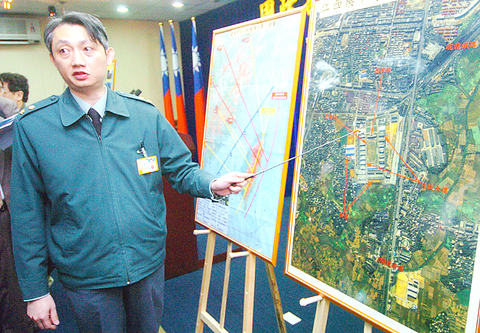The Ministry of National Defense (MND) said yesterday that China now has more than 800 missiles targeting Taiwan, and is increasing that arsenal at a faster pace of 75 to 100 per year.
The news came as Beijing defended its recent announcement of another double-digit increase -- 14.7 percent -- in this year's military budget.
"China was producing around 50 Dong Feng [DF] series ballistic missiles annually, but ... our intelligence has found it is now increasing by 75 to 100 ballistic missiles annually," said Lieutentant Colonel Chen Chang-hwa (

PHOTO: CHEN TSE-MING, TAIPEI TIMES
Chen said if cruise missiles are included, China now has more than 800 missiles aimed at Taiwan, enabling Beijing to potentially launch a five-wave missile attack continuing for 10 hours.
The PLA's ballistic missiles are now also more precise, according to Chen. They used to have a 600m margin of error, but that has been reduced to 50m, giving China the capability to more accurately hit Taiwan's power stations, radar bases, airstrips and military, economic and political nerve centers.
China's main ballistic missiles are DF-11 missiles that have a range of 600km, and DF-15 missiles that have a range of 800km, Chen added.
Chen said the PLA deploys its ballistic missiles in five bases in southeast China, at Leping and Kanzhou cities in Jiangxi Province, Meizhou City in Guangdong Province and Yongan and Xianyou cities in Fujian Province.
"The missiles can be transported by rail at any time to [China's] coastal areas," Chen added.
The MND also revealed details about the 1996 cross-strait missile crisis on the eve of the event's 10th anniversary.
On March 8, 1996, ahead of Taiwan's first presidential election, China fired ballistic missiles into the sea near Taiwan.
MND spokesman Rear Admiral Liu Chih-chien (
From July 21 to July 24, 1995, the PLA launched six DF-15 missiles from Jiangxi Province's Qianshan City, which traveled 481km before dropping into the sea 130km north of Taiwan, Liu said.
From March 8 to March 13, 1996, the PLA launched one DF-15 missile from Fujian Province's Nanping City, which traveled 500km and landed just 37km from Taiwan.
It also launched three DF-15 missiles from Yongan City that flew 460km before landing 55.5km from Kaohsiung City, Liu said.
"The two missile exercises proved that China's DF-series ballistic missiles, which have better accuracy, are able to effectively attack Taiwan's critical facilities and blockade the island," Liu said.
Liu said that while the 1995 missile drill was intended to bully Taiwan after former president Lee Teng-hui's (李登輝) visit to the US, the 1996 drill was an attempt to influence that year's presidential election.
The ministry had said that the missile exercises had a profound influence on the country's defense preparations.
The military started to develop anti-missile warfare capabilities after the drills, and began developing the nation's own strategic missiles to deter China.

CHAOS: Iranians took to the streets playing celebratory music after reports of Khamenei’s death on Saturday, while mourners also gathered in Tehran yesterday Iranian Supreme Leader Ayatollah Ali Khamenei was killed in a major attack on Iran launched by Israel and the US, throwing the future of the Islamic republic into doubt and raising the risk of regional instability. Iranian state television and the state-run IRNA news agency announced the 86-year-old’s death early yesterday. US President Donald Trump said it gave Iranians their “greatest chance” to “take back” their country. The announcements came after a joint US and Israeli aerial bombardment that targeted Iranian military and governmental sites. Trump said the “heavy and pinpoint bombing” would continue through the week or as long

TRUST: The KMT said it respected the US’ timing and considerations, and hoped it would continue to honor its commitments to helping Taiwan bolster its defenses and deterrence US President Donald Trump is delaying a multibillion-dollar arms sale to Taiwan to ensure his visit to Beijing is successful, a New York Times report said. The weapons sales package has stalled in the US Department of State, the report said, citing US officials it did not identify. The White House has told agencies not to push forward ahead of Trump’s meeting with Chinese President Xi Jinping (習近平), it said. The two last month held a phone call to discuss trade and geopolitical flashpoints ahead of the summit. Xi raised the Taiwan issue and urged the US to handle arms sales to

State-run CPC Corp, Taiwan (CPC, 台灣中油) yesterday said that it had confirmed on Saturday night with its liquefied natural gas (LNG) and crude oil suppliers that shipments are proceeding as scheduled and that domestic supplies remain unaffected. The CPC yesterday announced the gasoline and diesel prices will rise by NT$0.2 and NT$0.4 per liter, respectively, starting Monday, citing Middle East tensions and blizzards in the eastern United States. CPC also iterated it has been reducing the proportion of crude oil imports from the Middle East and diversifying its supply sources in the past few years in response to geopolitical risks, expanding

Pro-democracy media tycoon Jimmy Lai’s (黎智英) fraud conviction and prison sentence were yesterday overturned by a Hong Kong court, in a surprise legal decision that comes soon after Lai was jailed for 20 years on a separate national security charge. Judges Jeremy Poon (潘兆初), Anthea Pang (彭寶琴) and Derek Pang (彭偉昌) said in the judgement that they allowed the appeal from Lai, and another defendant in the case, to proceed, as a lower court judge had “erred.” “The Court of Appeal gave them leave to appeal against their conviction, allowed their appeals, quashed the convictions and set aside the sentences,” the judges